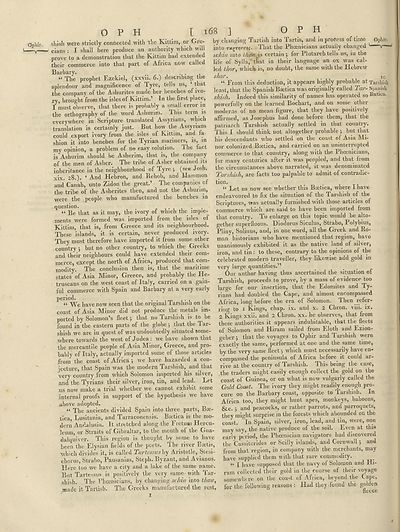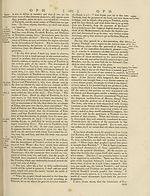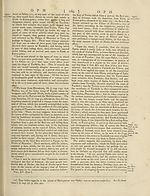Encyclopaedia Britannica > Volume 15, NIC-PAR
(188) Page 168
Download files
Complete book:
Individual page:
Thumbnail gallery: Grid view | List view

O P H
t
slush were strictly connected with the Kittim, or Gre-
I shall here produce an authority which will
cians . ^ i- ,
prove to a demonstration that the Kittim had extended
their commerce into that part ol Africa now called
Barbary. . .
“ The prophet Ezekiel, (xxvii. 6.) describing the
splendour and magnificence of Tyre, tells us, ‘ that
the company of the Ashurites made her benches ol ivo¬
ry, brought from the isles of Kittim.’ In the first place,
x must observe, that there is probably a small error m
the orthography of the word Ashunm. I Ins teim is
everywhere in Scripture translated Assyrians, which
translation is certainly just. But how the Assyrians
could export ivory from the isles ol Kittim, and fa
shion it into benches for the lyrian mariners, is, in
my opinion, a problem of no easy solution. 1 he tact
is Ashurim should be Asherim, that is, the company
of the men of Asher. The tribe of Asher obtained its
inheritance in the neighbourhood of Tyre ; (see Josh,
xix. 28.). ‘ And Hebron, and Rehob, and Mammon
and Canah, unto Zidon the great.’ The companies of
the tribe of the Asherites then, and not the Ashurim,
were the people who manufactured the benches in
question. .
“ Be that as it may, the ivory of which the imple¬
ments were formed was imported from the isles of
Kittim, that is, from Greece and its neighbourhood.
These islands, it is certain, never produced ivory.
They must therefore have imported it from some other
country ; but no other country, to which the Greeks
and their neighbours could have extended their com¬
merce, except the north of Africa, produced that com¬
modity. The conclusion then is, that the maritime
states of Asia Minor, Greece, and probably the IXe-
truscans on the west coast of Italy, carried on a gain¬
ful commerce with Spain and Barbary at a very early
period.
u We have now seen that the original Tarshish on the
coast of Asia Minor did not produce the metals im¬
ported by Solomon’s fleet; that no Tarshish is to^ be
found in the eastern parts of the globe ; that the 1 ar-
shish we are in quest of was undoubtedly situated some¬
where towards the west of Judea: we have shown that
the mercantile people of Asia Minor, Greece, and pro¬
bably of Italy, actually imported some of those articles
from the coast of Africawe have hazarded a con-
iecture, that Spain was the modern Tarshish, and that
very country from which Solomon imported his silver,
and the Tyrians their silver, iron, tin, and lead. Let
us now make a trial whether we cannot exhibit some
Internal proofs in support of the hypothesis we hare
above adopted.
“ The ancients divided Spain into three parts, Bae-
tica, Lusitania, and Tarraconensis. Bsetica is the mo¬
dern Andalusia. It stretched along the Fretum Hercu-
jeum, or Straits of Gibraltar, to the mouth of the Gua-
dalquivcr. This region is thought by some to have
been the Elysian fields of the poets. The river Baetis,
which divides it, is called Tartessus by Aristotle, Stesi-
ehorus, Strabo, Pausanias, Steph. Byzant, and Avianus.
Here too we have a city and a lake of the same name.
But Tartessus is positively the very same with Tar¬
shish. The Phoenicians, by changing sc/ri» into lhm/t
made it Tartish. The Greeks manufactured the rest,
I
168 ] O P H
by changing Tartish into Tartis, and in process of time Opliir.
into T*gT»jff-ff-4s. That the Phoenicians actually changed 1——
schin into than is certain $ for Plutarch tells us, in the
life of Sylla, that in their language an ox was cal¬
led thor, which is, no doubt, the same with the Hebrew
shor. 10
“ From this deduction, it appears highly probable at’x,ars]1js]i
least, that the Spanish Baetica was originally called Tar- Spanish
shish. Indeed this similarity of names has operated so Bsetica.
powerfully on the learned Bochart, and on some other
moderns of no mean figure, that they have positively
affirmed, as Josephus had done before them, that the
patriarch Tarshish actually settled in that country.
This I should think not altogether probable j but that
his descendants who settled on the coast of Asia M i¬
nor colonized Bsetica, and carried on an uninterrupted
commerce to that country, along with the 1 hcenicians,
for many centuries after it was peopled, and that fiom
the circumstances above narrated, it was denominated
Tarshish, are facts too palpable to admit of contradic¬
tion.
“ Let us now see whether this Bietica, where I have
endeavoured to fix the situation of the I arshish of the
Scriptures, was actually furnished with those articles of
commerce which are said to have been imported from
that country. To enlarge on this topic would be alto¬
gether superfluous. Diodorus Siculus, Strabo, Polybius,
Pliny, Solinus, and, in one word, all the Greek and Ro¬
mm/ historians who have mentioned that region, have
unanimously exhibited it as the native land of silver,
iron, and tin: to these, contrary to the opinions of the
celebrated modern traveller, they likewise add gold in
very large quantities.”
Our author having thus ascertained the situation of
Tarshish, proceeds to prove, by a mass of evidence too
large for our insertion, that the Edomites and Ty¬
rians had doubled the Cape, and almost encompassed
Africa, long before the era of Solomon. Then refer¬
ring to 1 Kings, chap. ix. and x. 2 Chron. viii. ix.
2 Kings xxii. and 2 Chron. xx. he observes, that from
these authorities it appears indubitable, that the fleets
of Solomon and Hiram sailed from Eloth and Ezion-
geber j that the voyages to Ophir and Tarshish were
exactly the same, performed at one and the same time,
by the very same fleet; which must necessarily have en¬
compassed the peninsula of Africa before it could ar¬
rive at the country of Tarshish. This being the case,
the traders might easily enough collect the gold on the
coast of Guinea, or on what is now vulgarly called the
Gold Coast. The ivory they might readily enough pro¬
cure on the Barbary coast, opposite to Tarshish. In
Africa too, they might hunt apes, monkeys, baboons,
&c. and peacocks, or rather parrots, and parroquets,
they might surprise in the forests which abounded on the
coast. In Spain, silver, iron, lead, and tin, were, one
may say, the native produce of the soil. Even at this
early period, the Phoenician navigators had discovered
the Cassiterides or Scilly islands, and Cornwall •, and
from that region, in company with the merchants, may
have supplied them with that rare commodity.
“ I have supposed that the navy of Solomon and Hi¬
ram collected their gold in the course of their voyage
somewhere on the coa-t of Africa, beyond the Cape,
for the following reasons : Had they found the golden
fleece
t
slush were strictly connected with the Kittim, or Gre-
I shall here produce an authority which will
cians . ^ i- ,
prove to a demonstration that the Kittim had extended
their commerce into that part ol Africa now called
Barbary. . .
“ The prophet Ezekiel, (xxvii. 6.) describing the
splendour and magnificence of Tyre, tells us, ‘ that
the company of the Ashurites made her benches ol ivo¬
ry, brought from the isles of Kittim.’ In the first place,
x must observe, that there is probably a small error m
the orthography of the word Ashunm. I Ins teim is
everywhere in Scripture translated Assyrians, which
translation is certainly just. But how the Assyrians
could export ivory from the isles ol Kittim, and fa
shion it into benches for the lyrian mariners, is, in
my opinion, a problem of no easy solution. 1 he tact
is Ashurim should be Asherim, that is, the company
of the men of Asher. The tribe of Asher obtained its
inheritance in the neighbourhood of Tyre ; (see Josh,
xix. 28.). ‘ And Hebron, and Rehob, and Mammon
and Canah, unto Zidon the great.’ The companies of
the tribe of the Asherites then, and not the Ashurim,
were the people who manufactured the benches in
question. .
“ Be that as it may, the ivory of which the imple¬
ments were formed was imported from the isles of
Kittim, that is, from Greece and its neighbourhood.
These islands, it is certain, never produced ivory.
They must therefore have imported it from some other
country ; but no other country, to which the Greeks
and their neighbours could have extended their com¬
merce, except the north of Africa, produced that com¬
modity. The conclusion then is, that the maritime
states of Asia Minor, Greece, and probably the IXe-
truscans on the west coast of Italy, carried on a gain¬
ful commerce with Spain and Barbary at a very early
period.
u We have now seen that the original Tarshish on the
coast of Asia Minor did not produce the metals im¬
ported by Solomon’s fleet; that no Tarshish is to^ be
found in the eastern parts of the globe ; that the 1 ar-
shish we are in quest of was undoubtedly situated some¬
where towards the west of Judea: we have shown that
the mercantile people of Asia Minor, Greece, and pro¬
bably of Italy, actually imported some of those articles
from the coast of Africawe have hazarded a con-
iecture, that Spain was the modern Tarshish, and that
very country from which Solomon imported his silver,
and the Tyrians their silver, iron, tin, and lead. Let
us now make a trial whether we cannot exhibit some
Internal proofs in support of the hypothesis we hare
above adopted.
“ The ancients divided Spain into three parts, Bae-
tica, Lusitania, and Tarraconensis. Bsetica is the mo¬
dern Andalusia. It stretched along the Fretum Hercu-
jeum, or Straits of Gibraltar, to the mouth of the Gua-
dalquivcr. This region is thought by some to have
been the Elysian fields of the poets. The river Baetis,
which divides it, is called Tartessus by Aristotle, Stesi-
ehorus, Strabo, Pausanias, Steph. Byzant, and Avianus.
Here too we have a city and a lake of the same name.
But Tartessus is positively the very same with Tar¬
shish. The Phoenicians, by changing sc/ri» into lhm/t
made it Tartish. The Greeks manufactured the rest,
I
168 ] O P H
by changing Tartish into Tartis, and in process of time Opliir.
into T*gT»jff-ff-4s. That the Phoenicians actually changed 1——
schin into than is certain $ for Plutarch tells us, in the
life of Sylla, that in their language an ox was cal¬
led thor, which is, no doubt, the same with the Hebrew
shor. 10
“ From this deduction, it appears highly probable at’x,ars]1js]i
least, that the Spanish Baetica was originally called Tar- Spanish
shish. Indeed this similarity of names has operated so Bsetica.
powerfully on the learned Bochart, and on some other
moderns of no mean figure, that they have positively
affirmed, as Josephus had done before them, that the
patriarch Tarshish actually settled in that country.
This I should think not altogether probable j but that
his descendants who settled on the coast of Asia M i¬
nor colonized Bsetica, and carried on an uninterrupted
commerce to that country, along with the 1 hcenicians,
for many centuries after it was peopled, and that fiom
the circumstances above narrated, it was denominated
Tarshish, are facts too palpable to admit of contradic¬
tion.
“ Let us now see whether this Bietica, where I have
endeavoured to fix the situation of the I arshish of the
Scriptures, was actually furnished with those articles of
commerce which are said to have been imported from
that country. To enlarge on this topic would be alto¬
gether superfluous. Diodorus Siculus, Strabo, Polybius,
Pliny, Solinus, and, in one word, all the Greek and Ro¬
mm/ historians who have mentioned that region, have
unanimously exhibited it as the native land of silver,
iron, and tin: to these, contrary to the opinions of the
celebrated modern traveller, they likewise add gold in
very large quantities.”
Our author having thus ascertained the situation of
Tarshish, proceeds to prove, by a mass of evidence too
large for our insertion, that the Edomites and Ty¬
rians had doubled the Cape, and almost encompassed
Africa, long before the era of Solomon. Then refer¬
ring to 1 Kings, chap. ix. and x. 2 Chron. viii. ix.
2 Kings xxii. and 2 Chron. xx. he observes, that from
these authorities it appears indubitable, that the fleets
of Solomon and Hiram sailed from Eloth and Ezion-
geber j that the voyages to Ophir and Tarshish were
exactly the same, performed at one and the same time,
by the very same fleet; which must necessarily have en¬
compassed the peninsula of Africa before it could ar¬
rive at the country of Tarshish. This being the case,
the traders might easily enough collect the gold on the
coast of Guinea, or on what is now vulgarly called the
Gold Coast. The ivory they might readily enough pro¬
cure on the Barbary coast, opposite to Tarshish. In
Africa too, they might hunt apes, monkeys, baboons,
&c. and peacocks, or rather parrots, and parroquets,
they might surprise in the forests which abounded on the
coast. In Spain, silver, iron, lead, and tin, were, one
may say, the native produce of the soil. Even at this
early period, the Phoenician navigators had discovered
the Cassiterides or Scilly islands, and Cornwall •, and
from that region, in company with the merchants, may
have supplied them with that rare commodity.
“ I have supposed that the navy of Solomon and Hi¬
ram collected their gold in the course of their voyage
somewhere on the coa-t of Africa, beyond the Cape,
for the following reasons : Had they found the golden
fleece
Set display mode to:
![]() Universal Viewer |
Universal Viewer | ![]() Mirador |
Large image | Transcription
Mirador |
Large image | Transcription
Images and transcriptions on this page, including medium image downloads, may be used under the Creative Commons Attribution 4.0 International Licence unless otherwise stated. ![]()
| Encyclopaedia Britannica > Encyclopaedia Britannica > Volume 15, NIC-PAR > (188) Page 168 |
|---|
| Permanent URL | https://digital.nls.uk/192584142 |
|---|
| Attribution and copyright: |
|
|---|
| Shelfmark | EB.11 |
|---|---|
| Description | Ten editions of 'Encyclopaedia Britannica', issued from 1768-1903, in 231 volumes. Originally issued in 100 weekly parts (3 volumes) between 1768 and 1771 by publishers: Colin Macfarquhar and Andrew Bell (Edinburgh); editor: William Smellie: engraver: Andrew Bell. Expanded editions in the 19th century featured more volumes and contributions from leading experts in their fields. Managed and published in Edinburgh up to the 9th edition (25 volumes, from 1875-1889); the 10th edition (1902-1903) re-issued the 9th edition, with 11 supplementary volumes. |
|---|---|
| Additional NLS resources: |
|

